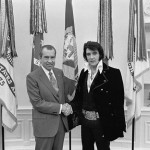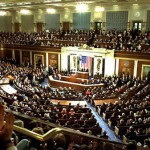After meeting at Regent University for the biennial gathering of the Conference on Faith and History (CFH), historians who sometimes identify themselves as evangelical are commenting in ways that raise questions both about evangelicalism and about scholarship from a distinctly evangelical outlook.
John Turner for instance agrees with what Jay Green observed, namely, that a gap is emerging between evangelical historians and evangelicals in the pew (as if the Trump candidacy hadn’t made that obvious back in February):
Jay Green, the CFH’s incoming president, spoke on Friday night on “Evangelical Historiography, Evangelical Identity, and the Spiritual Vision of History.” [Jay is the author of Christian Historiography: Five Rival Visions].
I won’t recapitulate the entire talk here, because 1) it will surely be published at some point; and 2) I didn’t take notes. What I took away from Jay’s remarks, however, is this:
– The Conference on Faith and History at its founding reflected an evangelical politics of identity, in which evangelicals alienated from the academy sought to gain a hearing for their scholarship.
– Historians who either are or have had some relationship with evangelicalism have indeed now gained a hearing for their scholarship. Rather than being alienated from the academy or from broader American culture, they are now alienated from churches and movements considered “evangelical.” The CFH, meanwhile, has broadened considerably beyond its evangelical roots.
Chris Gehrz largely agrees:
Not every CFH member is an evangelical, and some, as Jay’s survey found, are truly alienated from evangelicalism (I heard from at least two Catholic converts during the conference) and would no doubt wish Christian historians to devote their energy to causes other than contending for it. Many in the “ambivalent” camp feel that way because they think that “evangelical” has become a meaningless category — or at least (as John put it) that the term “certainly obfuscates as much as it illumines.”
Yet, the semi-evangelical character of CFH left Gerhz exuberant:
I came away from CFH2016 again grateful for my favorite professional society, the only one whose plenaries and panels so consistently leave me thinking anew about my faith, my profession, my calling, and how they intersect.
So too does another CFH historian, John Fea, share Turner’s ambivalence:
On this point, I agree wholeheartedly with Turner. I think any evangelical scholar/intellectual/academic will always be uneasy evangelicals as long as evangelicalism remains a largely anti-intellectual faith.
So why keep CFH going? What’s the point of gathering as formerly evangelical historians when you are ambivalent about being evangelical? Is it because, as I argued two decades ago, the historians who belong to CFH are more interested in fellowship than scholarship. That’s not a put down. All of these folks, Turner, Gehrz, and Fea are fine scholars. But why doesn’t the American Historical Association or the Organizations of American Historians — two prominent “secular” professional historical organizations — gun the historical engines of sort-of-born-again historians? One danger of these semi-religious academic associations, as Charles McCrary recently observed, as that Christian scholars can come off a tad clubby (or parochial) even while wanting to appear to be academically respectable:
Certain hackles were raised last month by an article on the website of the evangelical organization The Gospel Coalition. The article, “Top Biography Recommendations from 12 Christian Historians,” featured twelve white Protestant men suggesting, for the most part, biographies of white Protestant men written by, well, you can probably guess. Of the twelve historians, many were prominent members of what scholars of American religion might consider “our field.” Thus, many scholars on social media were upset by the list as a bad representation of our field. However, as Mike Altman asked on Twitter, “Why should scholars of religion think that TGC reflects our field at all?”
In other words, are evangelical historians evangelical or historians first? Since CFH is a scholarly organization, you would think the answer is “historian.” But as a religiously inspired organization, it’s identity may be more evangelical than scholarly. Some might say you don’t have to choose. But in the world of professional scholarship, you pay your dues to professional organizations and those are different from giving tithes at your congregation.
My own ambivalence about CFH — I’ve long since abandoned identifying with evangelicalism — is that people who attend the conference convey a sense that different rules apply since we gather as both scholars and believers. Faith is supposed to make a difference. We share a religious sensibility that allows us to empathize with the intellectual and spiritual factors at play in a paper’s research and arguments. Or we even have greater freedom than at the “secular” meetings to speak openly about our shared Christian commitment.
But these historians, many of whom know the history of Christianity, should also know that the history of the church is littered with disagreements, divisions, and even schisms. So if I go to a CFH meeting and start talking about the Orthodox Presbyterian Church or Reformed orthodoxy, does anyone else there care? Are the historians gathered going to have my back when it comes to a small, gruff, opinionated communion? Or do they want mainly to accent the positive and avoid talking about those matters of Christianity that divide everyone in the room?
If they want to avoid the hard stuff, that doesn’t sound to me very scholarly. Professors are supposed to ask the hard questions and get students and other scholars to probe to places of discomfort (safe spaces notwithstanding). Nor does it sound very Christian since all the historians in the room are likely going to different communions on the next Lord’d Day.












